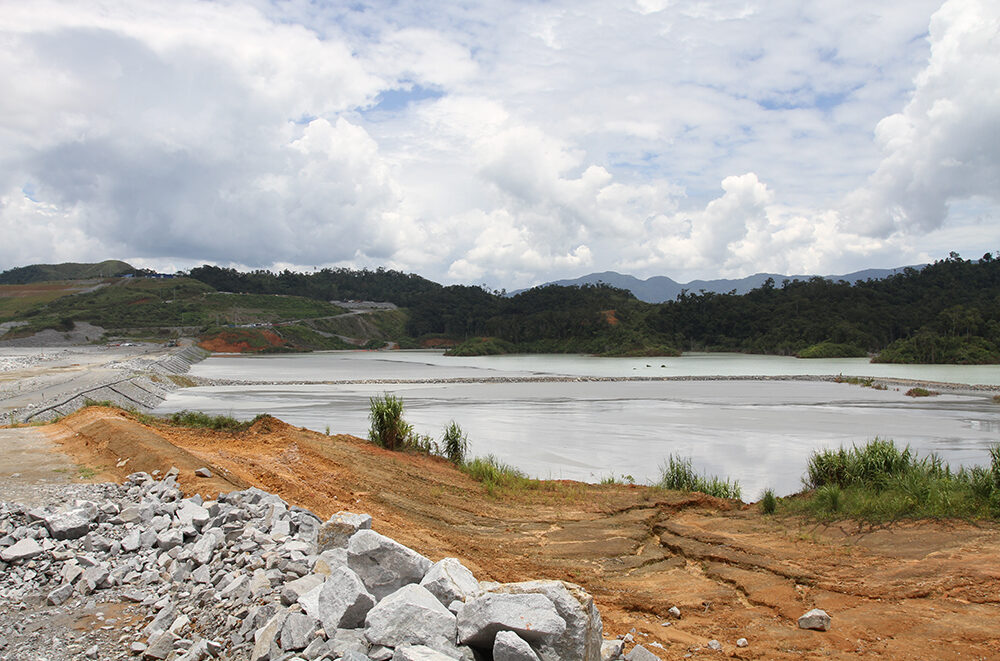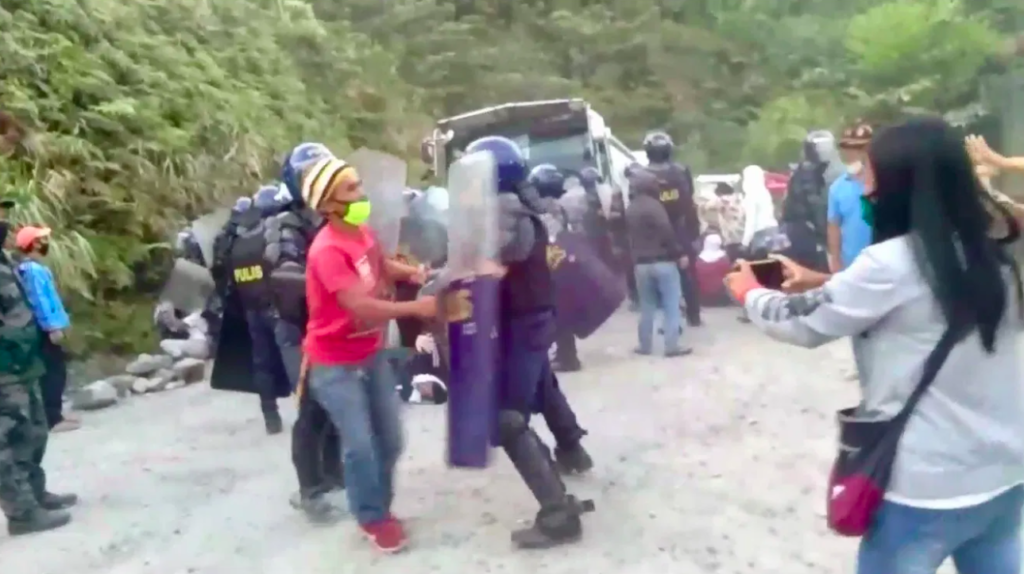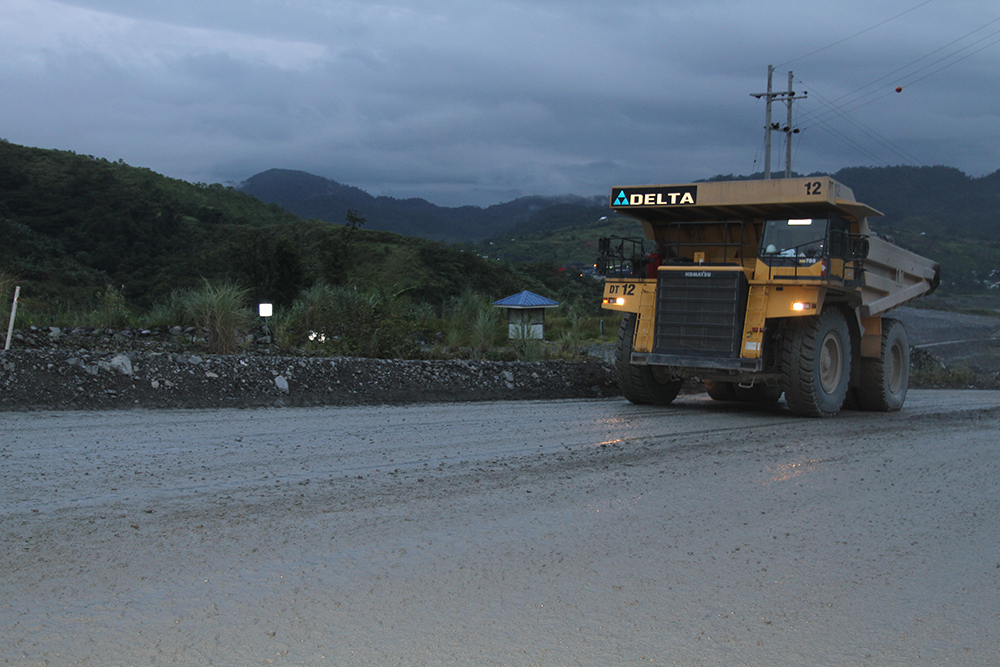
Photo: Tailings storage facility at OceansGold’s Didipio mine (Philippines). Credit: Hannibal Rhoades
Introduction by Hal Rhoades, Yes to Life – No to Mining
The mining industry has received little scrutiny during the Covid-19 pandemic, while fossil fuels, aviation and other dirty industries have found themselves in the spotlight.
But this doesn’t mean mining companies globally have not been seeking to profit from a crisis that affects us all.
More than 300 organisations from around the world have released an open-statement condemning the ways that the mining industry and numerous governments are taking advantage of the Covid-19 pandemic to manufacture new mining opportunities and enhance their damaged reputations.
The statement, based on a global analysis of over 500 sources, identifies four major trends in how the mining industry has abused the pandemic to turn a profit and advance their interests, putting land and water protectors at greater risk of harm. These trends are explored in-depth in a new report, entitled Voices from the Ground: How the Global Mining Industry is Profiting from the COVID-19 Pandemic.
In the context of an intersecting global health, economic, ecological and climate crisis, the statement asserts that healthy communities, Indigenous peoples, workers, and social movements – not the profits of predatory mining corporations – are essential during the pandemic and must be at the centre of plans moving forward.
The civil society statement is found below:
Global Solidarity with Communities, Indigenous Peoples and Workers at Risk from Mining Pandemic Profiteers
The mining industry is one of the most polluting, deadly, and destructive industries in the world. Yet to date, mining company responses to the COVID-19 pandemic have received little scrutiny compared to other industries seeking to profit from this crisis.
We, the undersigned organizations, condemn and reject the ways that the mining industry and numerous governments are taking advantage of the pandemic to manufacture new mining opportunities and establish a positive public image, now and for the future.
These actions pose an immediate threat to the health and safety of communities and organizations that have been struggling to defend public health and their environments against the destruction and devastation of mining extractivism for decades, as well as to the safety of workers in the mining sector.
Based on a collective analysis emerging from conversations with affected communities, workers, and civil society organizations, we have identified the following trends that exemplify this threat. A review of over 500 media sources, press releases, and reports on mining in the context of COVID-19 further informs these findings.
One: Mining companies are ignoring the real threats of the pandemic and continuing to operate, using any means available.
Mining companies and many governments have pushed to categorise mining as an essential service, enabling operations to continue despite substantial risk. In doing so, they have become key vectors for the spread of the virus and are putting communities, rural and urban populations, and their workforces, at great risk. In many cases, Indigenous and rural communities already face acute risk from the virus, especially communities whose health has been impacted by contamination generated by mining extractivism. They are struggling to protect themselves from potential outbreaks.
Two: Governments around the world are taking extraordinary measures to shut down legitimate protests and promote the mining sector.

Free of public oversight and scrutiny, governments have imposed restrictions on people’s freedom of association and movement to protect public health. But these severe and even militarized measures compromise people’s ability to defend their territories and their lives. Land defenders face greater risk of targeted violence and some remain unjustly imprisoned, posing additional risks of infection. Governments have also deployed state forces (military and police) to repress legitimate, safe protests, especially in instances where there is long standing opposition to a company’s activities. In some instances, this has included the implementation of regulations or obstacles to access the justice system which entrench impunity, as well as heightened military and police presence in these territories. Meanwhile, mining companies are permitted to continue operating in these same territories or do so, despite restrictions. These and other actions cynically and unjustly benefit the extractivist mining sector.
Three: Mining companies are using the pandemic as an opportunity to whitewash their dirty track records and present themselves as public-minded saviours
At a time when entire countries are struggling to get the bare minimum of test kits necessary, companies have boasted about the millions of privately sourced test-kits they have provided to affected communities and workers. This is poor cover for the long-term health impacts that regularly result from mining activities and the often underhanded ways in which these same firms operate. It also represents an affront to the greater public good and the collective efforts of many states and communities to secure public access to tests, highlighting the glaring asymmetries of power between multinational corporations and states in the Global South. In some cases, companies are giving out food directly to people, creating social division and undermining peaceful resistance while people are unable to mobilize in the context of the pandemic.
Some mining companies have set up assistance funds or made sizable donations to state ministries. These direct cash ‘donations’ are not only far from commensurate with the real impacts of their activities, they also represent a corruption risk, which is already evident as we see governments willing to weaken emergency measures, fail to enforce those in place, or exclude the mining industry from them entirely.
Four: Mining companies and governments are using the crisis to secure regulatory change that favours the industry at the expense of people and planet.

While they frame mining as essential now and for global post-COVID-19 economic recovery, mining companies are lobbying to expedite administrative decisions and weaken the already-limited measures which do exist to address the social, cultural, environmental, and economic impacts of their activities that are almost always borne by affected communities with complete impunity. Whether explicitly, by suspending the little environmental oversight and enforcement there was, or implicitly, by making it more challenging for affected communities to get information and intervene in permitting processes, governments are making deep concessions to the mining industry –and companies are now lobbying governments to make such deregulation permanent.
At the same time, companies are increasingly using supranational Investor State Dispute Settlement (ISDS) mechanisms, embedded in thousands of bilateral and multilateral trade agreements, to sue governments, especially in the Global South. They continue bringing or threatening suits in the hundreds of millions or even billions of dollars for decisions made by governments, courts and even human rights bodies, undermining national sovereignty to make decisions to protect public health and attacking the self-determination of people fighting to protect their wellbeing from extractive projects. Known pending mining claims -and where information is available -currently total US$45.5 billion dollars with the actual total potentially much higher. Further threats are feared in response to measures taken during the pandemic.
We condemn these responses to the COVID-19 pandemic as acts of aggression that exacerbate the threats and risks that affected communities, Indigenous peoples, land defenders and mine workers face on a daily basis.
We reject the central claim that mining represents an essential service either now or for the period of economic recovery. In the context of an intersecting global health, economic, ecological and climate crisis, we assert that healthy communities, Indigenous peoples, workers, and social movements –not the profits of predatory mining corporations –are essential.
We call on national governments to respect and support the autonomous organizing and self-determining processes of mining-affected communities and Indigenous peoples. Their efforts are vital to protecting community health and the environment, informed by their own knowledge and traditions, as well as to the food sovereignty of rural and urban populations through small-scale agriculture and other productive activities. Economic “reactivation” must not promote more mining, but should, instead, acknowledge and bolster community-based initiatives.
We call on international human rights bodies to pay close attention and actively condemn human rights violations committed by governments and mining corporations during the pandemic and the recovery period to follow.
We stand in solidarity with the frontline communities, Indigenous peoples and workers most affected by the COVID-19 crisis and the mining industry’s response. We call on others to support them in their vital campaigns for collective well-being and justice.
Signed by over 300 international, regional, and national organizations and networks, June 2020. Download the statement and list of signatories here.
